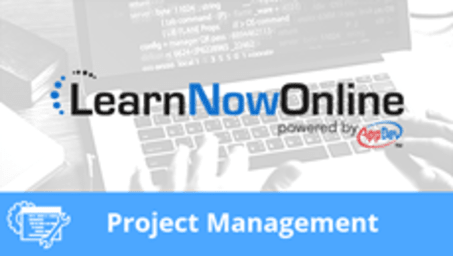
Project Management, Part 1 of 8: Getting Started
Course description
The course is based on PMI’s PMBOK Guide, Fifth Edition which has been available since January, 2013. PMBOK is an abbreviation for Project Management Body of Knowledge. It is the globally recognized standard and guide for the pm profession. It provides guidelines for managing individual projects and defines pm related concepts. It describes both the project and the pm life cycles, and their related processes.In this course we will at your role as the project manager and explore how it can be influenced by an organization’s portfolios, programs, and projects. You will identify the components of pm and how they relate to other disciplines within an organization. You will explore the relationship pm has to business and how it can be applied to align with business objectives. Next we will focus on how an organization’s culture, business frameworks, processes, procedures, and business requirements can influence how projects are conducted and managed. Now you will dive further into to the project life cycle and how the project phases are conducted in a variety of ways depending on the specific needs of the project. We will start looking at the PMI pm processes and examine how they apply to a project. Continuing the course, you will use the Initiating a Project processes to gather and identify the project components need to get a project started. Then you will be introduced to how developing a project charter is the 1st step in initiating a project. You will also learn about the Project Stakeholder Management Knowledge Area and how to identify project stakeholders.
Each LearnNowOnline training course is made up of Modules (typically an hour in length). Within each module there are Topics (typically 15-30 minutes each) and Subtopics (typically 2-5 minutes each). There is a Post Exam for each Module that must be passed with a score of 70% or higher to successfully and fully complete the course.
Prerequisites
This course is designed for users preparing for the project management certification. It is recommended before taking the certification that you also use the Project Management Book of Knowledge (PMBOK) Guide, Fifth Edition to study with.
Meet the expert
Sandy Haydon
Sandy Haydon is a certified project manager in software development and a project management instructor. She has 40 years of experience with IBM as a software developer, manager, and project manager responsible for leading teams located worldwide. Sandy holds a BA in Mathematics and an MA in Management and is a certified Project Management Professional (PMP) and an IBM Senior Certified Project Manager.
Video Runtime
110 Minutes
Time to complete
190 Minutes
Course Outline
Components and Values
Components (19:16)
- Introduction (00:36)
- What is a Project (00:39)
- Types of Projects (00:51)
- Project Management (00:59)
- Portfolios, Programs, Projects (00:45)
- Project Uses (00:36)
- OPM Comparison (01:18)
- Portfolio Management (00:54)
- Program Management (00:24)
- PMO (01:32)
- Role of the Project Manager (00:23)
- Responsibilities (00:19)
- Competencies (00:45)
- Interpersonal Skills (05:07)
- The PMBOK® Guide (03:02)
- Ethics & Professional Conduct (00:24)
- Summary (00:33)
Business Values (06:59)
- Introduction (00:41)
- Business Value (00:50)
- Business Value Development (00:52)
- Operations Management (01:59)
- Strategy and Governance (01:47)
- Reflective Questions (00:27)
- Summary (00:20)
Organization
Identify Organization Influences (11:40)
- Introduction (01:06)
- Cultures and Styles (01:22)
- Organizational Communications (00:47)
- Organizational Structures (01:10)
- The Functional Structure (00:47)
- Projectized Structure (00:30)
- Matrix Structures (01:19)
- The Composite Structure (00:46)
- Organizational Process Assets (02:26)
- Enterprise Enviromental Factor (00:50)
- Summary (00:31)
Stakeholders and Governance (05:56)
- Introduction (00:25)
- Project Stakeholders (01:24)
- Project Stakeholder Types (01:58)
- Project Governance (01:07)
- Project Success (00:44)
- Summary (00:15)
Project Team (02:54)
- Introduction (00:32)
- Project Teams (01:10)
- Project Team Composition (00:58)
- Summary (00:12)
Project Life Cycle (09:56)
- Introduction (00:41)
- The Project Life Cycle (01:13)
- General Characteristics (00:43)
- Project Risks and Costs (01:00)
- Project Phases (00:29)
- Phase-to-Phase Relationships (01:14)
- Progressive Elaboration (00:59)
- Predictive Life Cycles (00:27)
- Iterative and Incremental (01:06)
- Adaptive Life Cycle (01:06)
- Reflective Questions (00:25)
- Summary (00:28)
Knowledge Areas
Processes & Knowledge Areas (10:56)
- Introduction (01:01)
- Project Management Processes (02:11)
- Inputs/Tools & Techniques/Output (01:01)
- Common Process Interactions (01:34)
- Initiating Process Group (00:39)
- Planning Process Group (01:03)
- Executing Process Group (00:53)
- Monitoring & Controlling Group (01:13)
- Closing Process Group (00:32)
- Summary (00:45)
Knowledge Areas (07:42)
- Introduction (00:20)
- Knowledge Areas (01:47)
- Project Time Management (05:13)
- Summary (00:22)
Project Information (03:09)
- Introduction (00:29)
- Project Information (01:36)
- Types of Project Information (00:48)
- Summary (00:14)
Charter and Stakeholders
Develop Project Charter (20:00)
- Introduction (01:13)
- What is a Project Charter (02:30)
- Develop a Project Charter (00:37)
- Develop Project Charter Inputs (01:43)
- Business Case (02:45)
- Agreements (00:34)
- Enterprise Environmental Factors (00:21)
- Organizational Process Assets (00:39)
- Charter Tools and Techniques (00:39)
- Expert Judgment (00:52)
- Facilitation Techniques (00:20)
- Project Charter Outputs (00:27)
- Developing a Project Charter (02:26)
- Project Charter Example (04:29)
- Summary (00:16)
Project Stakeholders (12:05)
- Introduction (00:41)
- Identify Stakeholders (00:35)
- Who is a Stakeholder (00:57)
- Identify Stakeholder Process (00:20)
- Identify Stakeholder Inputs (01:34)
- Procurement Documents (00:35)
- Stakeholder Tools & Techniques (00:37)
- Stakeholder Analysis (02:12)
- Meetings (00:43)
- Identify Stakeholder Outputs (00:17)
- Stakeholder Register (00:31)
- Identify Stakeholder Guides (00:40)
- Register Example (01:51)
- Summary (00:24)







